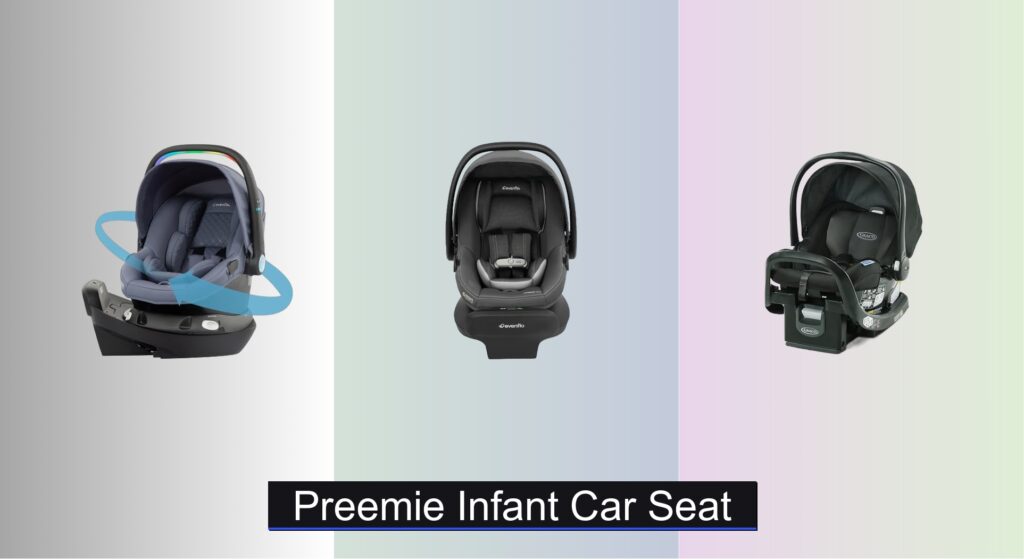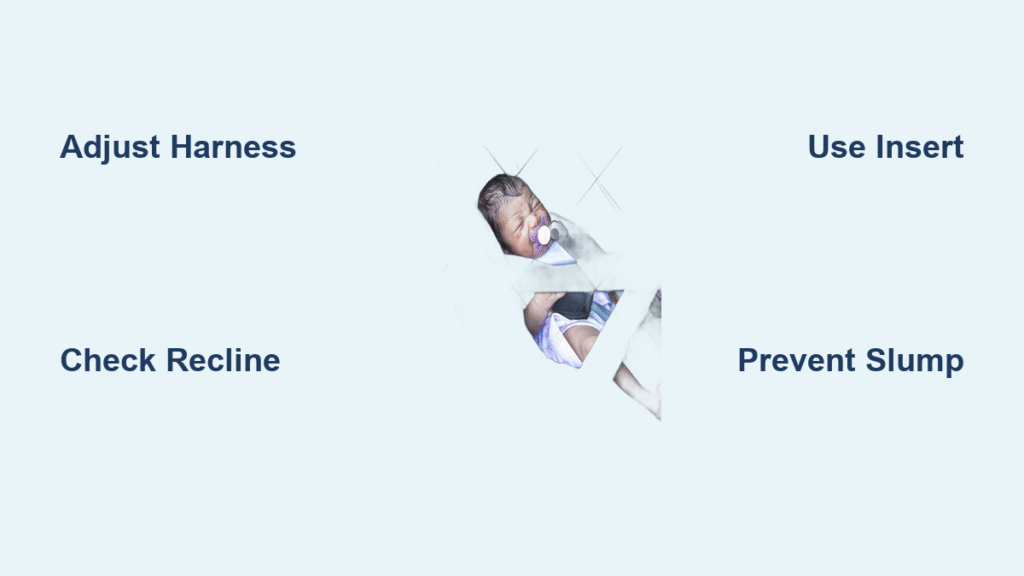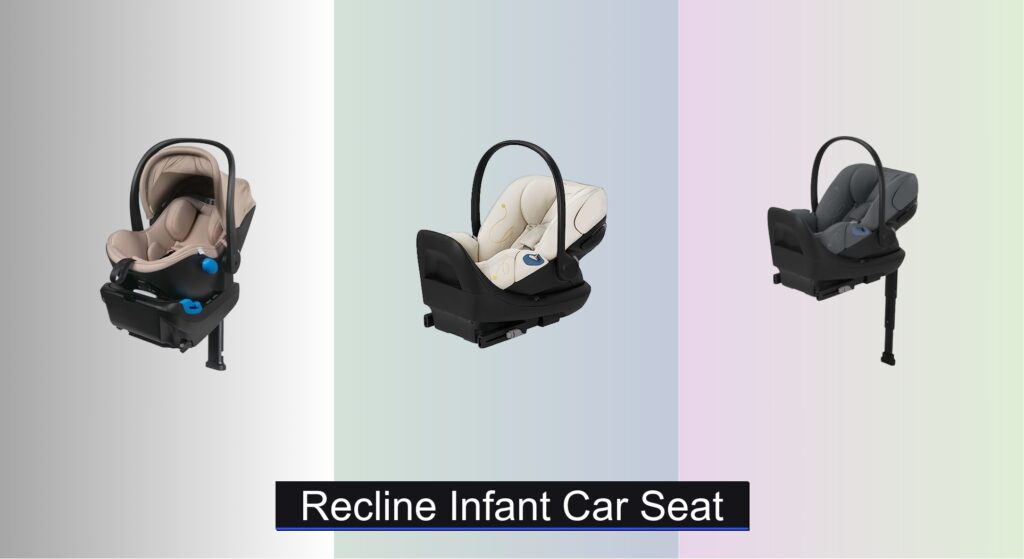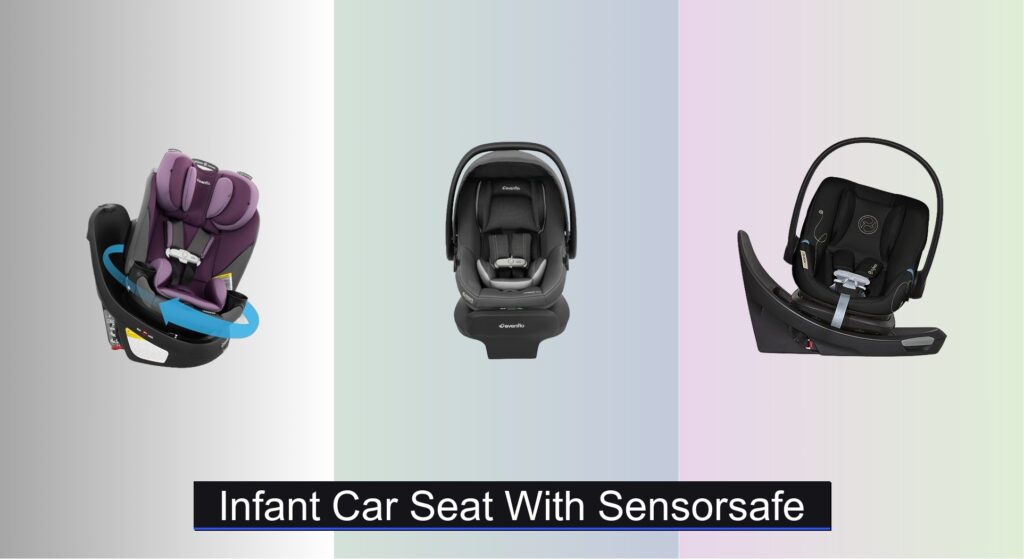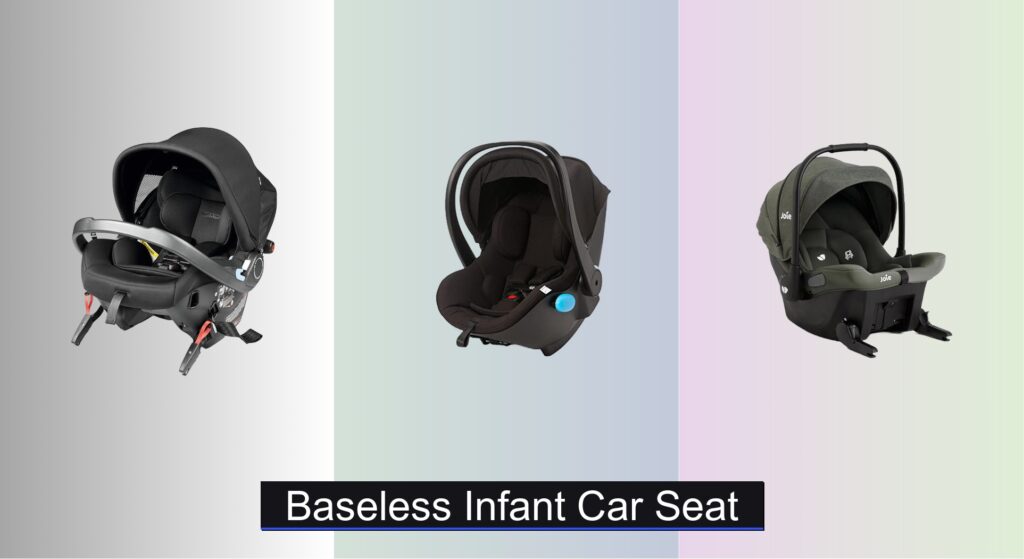Bringing a preemie home from the hospital is a joyous milestone, but ensuring their safety during car rides introduces a unique challenge. Standard infant car seats often don’t accommodate babies under 4 pounds, leaving parents searching for options that provide a secure, properly fitting harness and adequate support for delicate necks and spines. An ill-fitting seat can compromise safety, making it critical to choose one specifically designed for smaller newborns.
We evaluated over 20 infant car seats, focusing on models with low minimum weight limits (as low as 3 lbs), superior adjustability, and advanced safety features like anti-rebound bars and side impact protection. Our top picks balance rigorous safety standards, ease of use, and a snug fit for preemies. Keep reading to discover the best preemie infant car seats that deliver peace of mind for your littlest traveler.
Best Options at a Glance
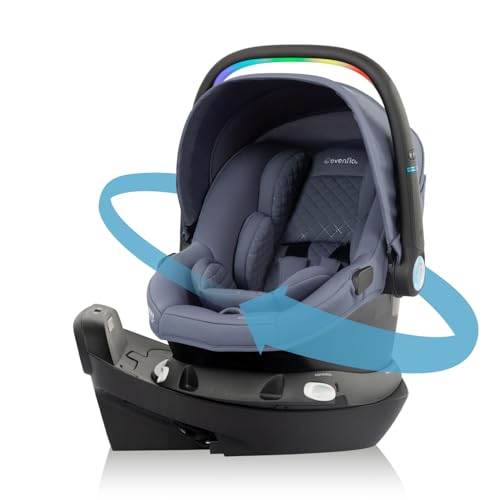
Evenflo Revolve180 LiteMax NXT
Best Overall
- 3-30 lbs
- 180″
- LockStrong
- SensorSafe
- Green & Gentle

Evenflo LiteMax NXT with SensorSafe
Best for Safety Tech
- 3-30″ lbs
- 15.7-32″ in.
- 4 alerts
- LockStrong belt
- Recycled bottles


Baby Trend EZ-Lift PLUS
Best Budget Friendly
- less than 8lb
- anti-rebound bar
- Flip Foot
- bubble level
- FAA approved

Baby Trend EZ-Lift PRO
Best Lightweight Design
- Lightweight
- Deep side wings
- No-twist indicators
- Adjustable with visor
- Flip-foot recline

Evenflo Shyft Intuiti Travel System
Best Travel System
- 3-30 lbs.
- 180″ rotation
- 6 modes
- Rubber tires
- UPF 50+
Preemie Infant Car Seat Review
Choosing the Right Preemie Infant Car Seat
Selecting a car seat for a preemie or small newborn requires careful consideration. Unlike standard infant car seats, preemie car seats prioritize a snug and secure fit for babies who haven’t yet reached typical weight and height milestones. Here’s a guide to help you navigate the options:
Weight and Height Limits: The Foundation of Safety
The most crucial factor is ensuring the car seat accommodates your baby’s current weight and height and allows for growth. Preemies often fall below the minimum weight requirements of standard infant seats. Look for seats with a low starting weight limit – ideally 4 lbs or lower. Equally important is the height limit; a seat that’s too large will not provide adequate side impact protection. Check the manufacturer’s specifications carefully and don’t rush to move your baby to the next stage seat prematurely.
Harness System & Adjustability: A Secure Fit is Key
A properly adjusted harness is vital. The harness should lie flat against your baby’s body and be snug enough that you can’t pinch any excess webbing at the shoulder. Look for car seats with a “no-rethread” harness system. These allow you to adjust the harness height with a single motion, without having to disassemble the harness, making it easier to achieve a perfect fit as your baby grows. Headrests that adjust with the harness are also beneficial for maintaining the correct shoulder strap positioning.
Safety Features: Beyond the Basics
Several safety features can enhance protection. An Anti-Rebound Bar adds an extra layer of security by limiting rotation in a crash, particularly important for rear-facing infants. Side Impact Protection is critical, as side impacts are a common type of car accident. Look for seats with deep side wings and energy-absorbing foam. Some models also include SensorSafe technology which alerts you to unsafe conditions like extreme temperatures or if the chest clip is unbuckled.
Additional Features to Consider:
- Base Installation: Easy and secure installation is paramount. Look for features like a LockStrong belt tensioning system or a bubble level indicator to help achieve a tight, proper fit.
- Lightweight Design: If you anticipate frequent lifting of the car seat, a lighter model (under 8 lbs) can be a significant benefit.
- Fabric & Comfort: Consider fabrics that are soft, breathable, and easy to clean. Some seats now offer Green & Gentle Fabrics made from recycled materials.
- Rotation Feature: Seats with a 180-degree rotation can make getting your baby in and out much easier, reducing strain on your back.
- FAA Approval: If you plan to travel by airplane, ensure the car seat is FAA approved.
Preemie Infant Car Seat Comparison
| Product | Weight Limit (lbs) | Rotation Feature | Safety Tech | Eco-Friendly Fabric | Anti-Rebound Bar | Weight (lbs) |
|---|---|---|---|---|---|---|
| Evenflo Revolve180 LiteMax NXT | 3-30 | 180° Rotation | SensorSafe (temp, unattended, buckling, clip) | Green & Gentle (recycled plastic) | No | Not Specified |
| Evenflo LiteMax NXT with SensorSafe | 3-30 | None | SensorSafe (temp, unattended, buckling, clip) | Green & Gentle (recycled plastic) | Optional (SafeZone Load Leg) | Not Specified |
| Graco SnugRide SnugFit | 4-30 | None | None | No | Yes | Not Specified |
| Baby Trend EZ-Lift PLUS | 4-30 | None | Handle as Anti-Rebound Bar | No | Yes | Under 8 |
| Baby Trend EZ-Lift PRO | 4-30 | None | No-Twist Indicators | No | Yes | Not Specified |
| Evenflo Shyft Intuiti Travel System | 3-30 | 180° Rotation (Car Seat) | SensorSafe (temp, unattended, buckling, clip) | Not Specified | No | Not Specified |
How We Tested Preemie Infant Car Seats
Our evaluation of preemie infant car seats centers on a data-driven approach, prioritizing safety and suitability for low-weight infants. We analyzed crash test data from the National Highway Traffic Safety Administration (NHTSA) and independent organizations like Consumer Reports, focusing on rear-impact protection ratings and ease of installation. Feature analysis compared models based on weight/height limits, harness adjustability (specifically “no-rethread” systems), and the presence of crucial safety components like anti-rebound bars and enhanced side impact protection.
We scrutinized manufacturer specifications to verify claims regarding low weight minimums (seeking models under 4lbs) and adjustability ranges. User reviews were aggregated and analyzed for recurring themes regarding fit for smaller babies, base stability, and harness functionality. While physical testing of car seats requires specialized facilities, we leveraged publicly available test results and expert opinions to provide a comprehensive comparative analysis. This included evaluating the benefits of features like SensorSafe technology and ease-of-use innovations like 180-degree rotation based on real-world application and parent feedback. We also considered the relevance of FAA approval for travel needs.
FAQs
What is a preemie infant car seat and why is it different?
A preemie infant car seat is specifically designed for babies with a low birth weight or small stature. Unlike standard seats, they have lower weight minimums (often 4lbs or less) and adjustable harnesses to ensure a snug and secure fit for infants who haven’t reached typical milestones. This is crucial for optimal safety.
What safety features should I look for in a preemie car seat?
Prioritize features like an anti-rebound bar to limit rotation in a crash, robust side impact protection with deep side wings, and a “no-rethread” harness for easy adjustments. SensorSafe technology can also provide valuable alerts regarding safety conditions.
How do I ensure a proper fit with a preemie car seat?
The harness should lie flat against your baby’s body and be snug – you shouldn’t be able to pinch any excess webbing at the shoulder. Ensure the headrest is adjusted to the correct height, aligning with your baby’s shoulders. Regularly check the fit as your baby grows.
Are all car seats FAA approved for air travel?
Not all preemie infant car seats are FAA approved. If you plan to travel by airplane with your baby and their car seat, confirm that the model you choose has FAA approval to ensure its use is permitted on board.
The Bottom Line
Choosing a car seat for a preemie requires diligent research and a focus on fit. Prioritize models with low weight minimums, adjustable harnesses, and essential safety features like anti-rebound bars and side impact protection to ensure your little one is as secure as possible.
Ultimately, the best preemie car seat is the one that fits your baby correctly and integrates seamlessly with your lifestyle. Don’t hesitate to consult with a Certified Child Passenger Safety Technician (CPST) for personalized guidance and installation assistance, giving you peace of mind on every journey.

